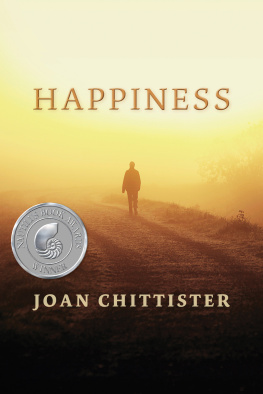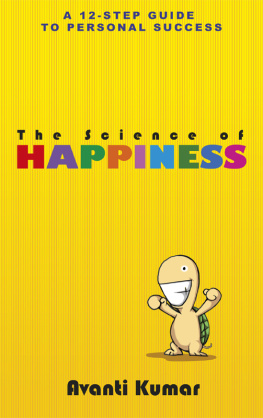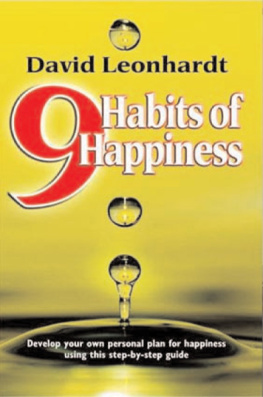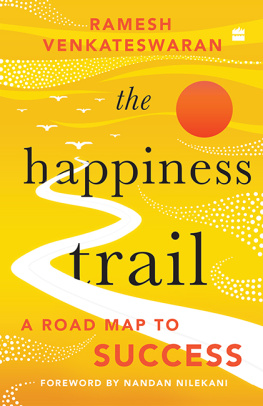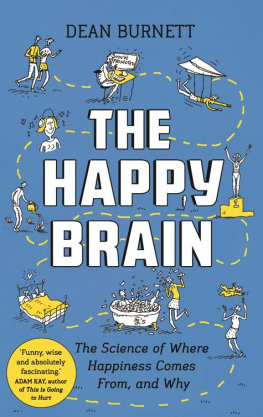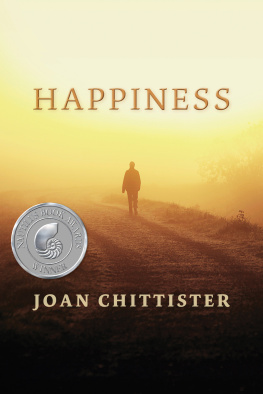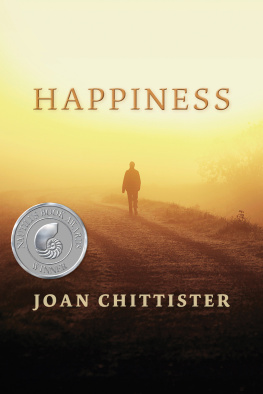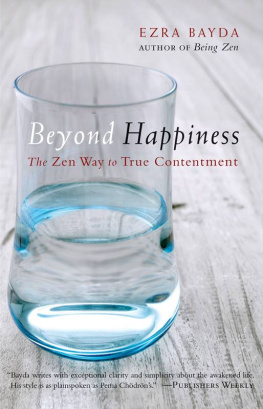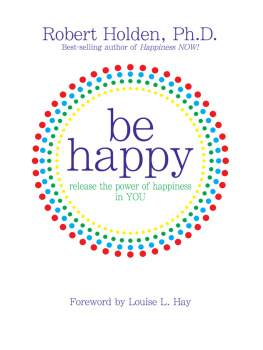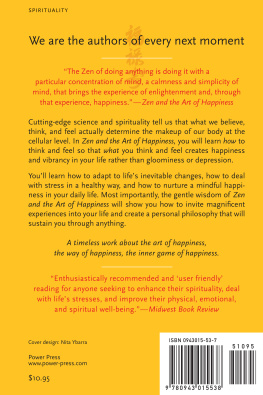HAPPINESS
Joan Chittister
William B. Eerdmans Publishing Company
Grand Rapids, Michigan / Cambridge, U.K.
2011 Joan Chittister
All rights reserved
Hardcover edition 2011
Paperback edition 2012
Published 2011 by
Wm. B. Eerdmans Publishing Co.
2140 Oak Industrial Drive n.e., Grand Rapids, Michigan 49505 /
p.o. Box , Cambridge cb3 9pu U.K.
Library of Congress Cataloging-in-Publication Data
Chittister, Joan.
Happiness / Joan Chittister.
p. cm.
Includes bibliographical references (p. ).
ISBN 978-0-8028-6929-6 (pbk: alk. paper)
eISBN 978-1-4674-3419-5 (ePub)
eISBN 978-1-4674-1707-5 (Kindle)
1. Happiness. 2. Happiness Religious aspects. I. Title.
BF575.H27C49 2011
152.4 2 dc23
2011020581
www.eerdmans.com
This book is dedicated to
Susan Doubet, OSB,
in gratitude for the kind of
support and service
that makes for a happy life
mine, for sure; hers, too, I hope.
Contents
H appiness is very serious business. It is not to be taken for granted. It is not to be assumed that simply being alive assures that we can become the epitome of our own aspirations. Nor is it a guarantee that our own aspirations, our own definition of happiness, is itself the true end of the rainbow.
Society, culture, advertising all do their part in defining the happiness we seek. We see it on television: It is a brand new car with a tall, sinuous woman draped over it. It is a college degree with the promise of an exotic life. It is a life without work, without worry, without the need for money.
But that is not all it is. If any of that at all, in fact.
The truth is that there is as much a substance to happiness as there is a hope that someday, somehow, we will find ourselves in a place of.... Of what? Of pleasure. Of satisfaction. Of status. Of security. Of fame. Of what? It is the discovering of what that has been the purpose of this book.
The serious search for happiness is an excursion into many levels and facets of life. It is the honest appraisal of whether what weve been told to achieve in life has itself been the substance of our happiness. It is a reflective assessment of how were told we can get it.
Happiness has many experts: sociologists, scientists, psychologists, philosophers, and purveyors of great spiritual traditions. What does each of them have to tell us about the very essence of happiness? This book has been a pilgrimage through all of those coordinates of life. What each of them tells us deserves great thought, astute comparison, gentle prodding, and, in the end, some kind of synthesis designed to balance the separate equations.
Rather than my simply offering one more personal formula for happiness, I felt strongly that this book could be valuable only if it looked at these many dimensions of what the world calls happiness so that readers might be better able to find themselves in it and so be able to chart their own course to it for the rest of lifes journey.
The task has been a deeply revealing one. Im personally very happy that I wrote this book. If no one else but me ever reads it, it will have integrated a great deal of life for me, given me a measure by which to assess the various ambits of my own life, to determine what was too much in one place, too little in another.
I hope for you the same experience as we hold up kernels from each discipline and examine the impact they have had on our own search for happiness, our own slippages into excess.
But a task of this scope requires a great deal of support. I have had more of that than is anyones right.
I am most grateful to my editor, Sandra De Groot, for her continuing patience with me as I moved from one perspective to another. Most of all, I will look back on her encouragement and her trust as one of the great gifts of my writing life.
I am grateful in another way to those around me who have always carried part of the load that comes with writing, the part that, first, makes the writing possible and then, second, makes the space for doing it real. I am grateful in a special way to Maureen Tobin, OSB, longtime co-worker, assistant, and friend. I owe the fact that I have been able to take the time from daily schedules to do the research and writing that such work entails to her. She keeps the world at the door while I hide from it.
I am grateful to Mary Lou Kownacki, OSB, whose editors eye and poets heart keep me singing when I am inclined more to teach. I am grateful, too, to Susan Doubet, OSB, for the numberless patient hours of copy reading and manuscript preparation such a work requires. The time they each gave to this work of editorial refinement has made it better than I could have ever done alone.
I am most grateful to the body of readers who tested the text against their own lives, made recommendations, gave life, and provided the confirmation of ideas that brought the text to the bar of reality. Linda Romey, OSB, Anne McCarthy, OSB, and Marlene Bertke, OSB, brought generous measures of keen insight and crisp direction to the shaping of the work. Gail Freyne, Jerry Trambley, Barbara Roseborough, Lyta and Bob Seddig all offered, from their own disciplines, expertise, and personal experience, a vantage point for looking both at the material and at the expectations of the readers. The time this work took for all of them to reply with such acuity is a gift too great to begin to repay.
All of that reflection and criticism and support gave new life and depth to both the work and the text. What remains of the unsaid or the poorly said belongs to me alone.
Finally, I am grateful to my community at large, the Benedictine Sisters of Erie, for the lifelong support they have given to my very strange penchant for writing as a bona fide vocation within my vocation.
One thing I learned from this book is that happiness is surely possible but may not be what we think it is when we begin the search.
I n folktales of the East written thousands of years ago, there is a story which, in the annals of contemporary happiness research, is still as fresh as yesterday.
Once upon a time, an angel appeared to a seeker hard at work in the field of life and said, I have been instructed by the gods to inform you that you will have 10,000 more lives.
The wanderer, who had been pursuing the dream of eternal life for years, slumped to the ground in despair. Oh, no, the seeker cried. Ten thousand more lives; ten thousand more lives! and the seeker wailed and rolled in the dust.
Then the angel moved on to another seeker bent over in the heat of the day and repeated the same message. I have been told to tell you, the angel said, that you will have 10,000 more lives.
Really? the seeker exclaimed. Ten thousand more lives? Then the seeker straightened up, arms flung toward heaven, head up, face beaming, and began to dance and prance and shout with joy. Only 10,000 more lives! the seeker cried ecstatically. Only 10,000 more lives!
The story leaves us totally disarmed if not completely dumbfounded.
Its winsome. But it can also be confusing. Which seeker really understands best the nature of life? Or, better yet, does either of them?
There is, Ive come to understand as the years go by, a bit of both those seekers in all of us. Certainly in me.
One part of me, like the seeker promised 10,000 more lives, goes in and out of phases at the very thought of it, moaning with the Hebrew psalmist as I go, O woe is me that my journey is prolonged. With the poet, I all alone beweep my outcaste state when life takes one of its erratic swings and turns on me, deprives me, I think, or rejects me, or, most of all, denies me what I want. I mourn the lack of some thing, someone, some time, somewhere, which, Im certain, must surely make me happy again.

